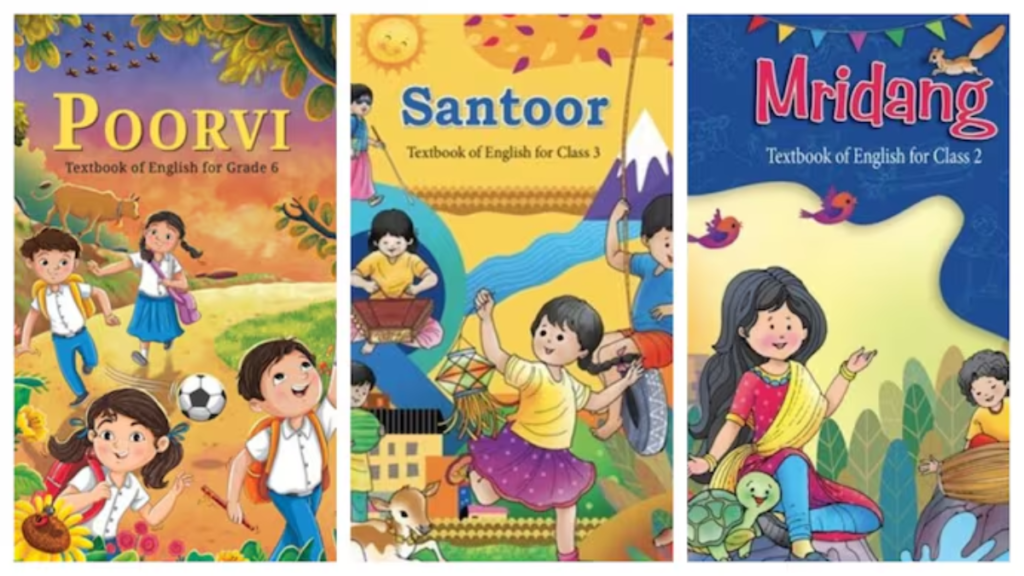NCERT has stood by its recent decision to title English language textbooks after Indian classical ragas and musical instruments, citing cultural sensitivity, educational ideology, and the precepts of the National Education Policy (NEP) 2020. The statement comes following bitter criticism from Kerala Education Minister V Sivankutty, who criticized the NCERT for inflicting Hindi imposition by substituting old familiar English titles with Hindi titles.
Spurning criticism of cultural imposition, the National Council of Educational Research and Training (NCERT) explained that textbook titles like Santoor, Poorvi, Mridang, and Veena are neither random selections nor haphazardly picked marks of India’s rich musical traditions. As claimed by the NCERT, they are “ubiquitous for all linguistic and cultural practices in the country” and aim at creating “an integrated language of happiness” inside the classroom.
The row broke out following the replacement of Class 7 English textbook, once known as Honeycomb, with Poorvi, named after an ancient Indian raga. The same was done by Class 6’s English book, which was once known as Honeysuckle and was also rechristened as Poorvi. The Class 4 English textbook, once known as Marigold, is now known as Santoor, named after the Kashmiri stringed instrument.
Kerala Education Minister V Sivankutty vigorously protested this change, claiming that the NCERT move “violates federal principles and constitutional values.” Sivankutty contended that changing English titles to Hindi, particularly in non-Hindi-speaking areas, dilutes linguistic diversity and causes confusion among English-medium school students.
“Education must not be a tool of imposition but one of empowerment and consensus,” Sivankutty said. “Textbook titles are not just names—they mold the imagination and perception of children.

NCERT: Are Musical Terms More Than Just Titles?
In its lengthier reply, NCERT repeated that the use of musical titles was the result of a tradition that goes back a long way and indicates a conscious effort to commemorate India’s cultural homogeneity. The Council clarified that these titles are not Hindi designations but identification with Indian musical heritage, both Hindustani and Carnatic. For instance, the Class 1 and 2 textbooks are named Mridang, a percussion instrument of Carnatic music, whereas Santoor is from Kashmir, and Poorvi is a raga well known in both North and South Indian music traditions.
NCERT further clarified that the naming of the textbooks follows the National Curriculum Framework for School Education (NCFSE) 2023 and the overall vision of NEP 2020, which emphasizes joyful learning, being Indian culture-rooted, and incorporating the arts within education. The Council stated that the names were chosen not to advocate for a particular language but to create curiosity, a sense of belonging, and pride among the students.
These words are not replaceable or translatable,” the NCERT stated. “They have strong cultural and linguistic connotations, enabling children to identify more with their Indian heritage.”
The NCERT also reacted against apprehensions of linguistic prejudice by stating that all textbooks are in the process of being translated into the 22 scheduled Indian languages to promote accessibility and regional diversity. The new textbooks are not exclusive to English but have been crafted for Classes 1 through 8 in the form of phased curriculum revision. Textbooks for Classes 1 and 2 were rolled out in 2023, followed by Classes 3 and 6 in 2024, and Classes 4, 5, 7, and 8 now in 2025.
The NCERT’s naming conventions are not limited to language textbooks. The newly titled Class 6 mathematics textbook Ganit Prakash, for example, draws from India’s ancient mathematical tradition, honoring figures like Aryabhata, Bhaskaracharya, Brahmagupta, and Srinivasa Ramanujan. The older math books, by contrast, had no distinct titles.
By renaming its books after traditional symbols of culture, NCERT announced it aims to instill greater respect for India’s multiple systems of knowledge. It pointed out that music and mathematics are universally as well as culturally relevant topics which can establish linkages between local identities and national integration.
“The practice is symbolic of the diversity and oneness of India,” the NCERT said, “encouraging a festive and culturally contextualized learning process for all.
In spite of NCERT’s assurances, the controversy brings to the fore a perennial tension between national curriculum changes and local sensitivities. Although NEP 2020 advocates cultural inclusivity, opponents such as Sivankutty believe that implementation decisions—specifically, language—need to be approached with more sensitivity in multilingual states.
Language has been a politically sensitive subject in Indian schooling for many years. Kerala, Tamil Nadu, and other states of the south have traditionally resisted initiatives perceived to be advancing Hindi at the expense of local languages or English. The present controversy over names, however, despite being focused on musical imagery, has therefore again raised older concerns over centralized curriculum planning and homogenization of cultures.
Nevertheless, NCERT claims that its approach is pedagogy-driven, not political. The council stressed that book titles such as Poorvi or Santoor are meant to stimulate imagination, facilitate happy learning, and allow young readers to connect with India’s collective artistic heritage—irrespective of the language of instruction.
“The aim is to empower, not alienate,” NCERT stated, “by grounding education in India’s composite cultural traditions.
With textbook reforms in progress and new editions anticipated in the next few years, the controversy regarding language, culture, and curriculum identity is not yet over. For the moment, NCERT is sticking to its call, asking critics to see the changes not as a political statement but as a cultural and educational statement based on the ethos of NEP 2020.
ALSO READ
Indian Students Face Crushing 27% Visa Decline Across Top 3 Nations
Pingback: Unusual Protest in Delhi College: Students Use Cow Dung to Cool Principal’s Office -
Pingback: Karnataka government requests NMC to increase medical seats as NEET aspirants increase -